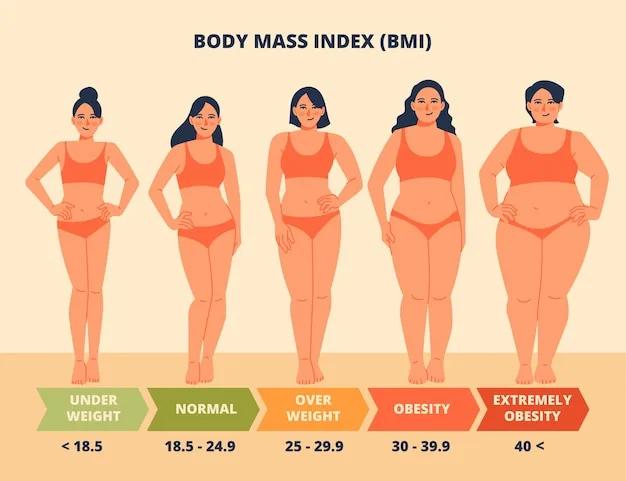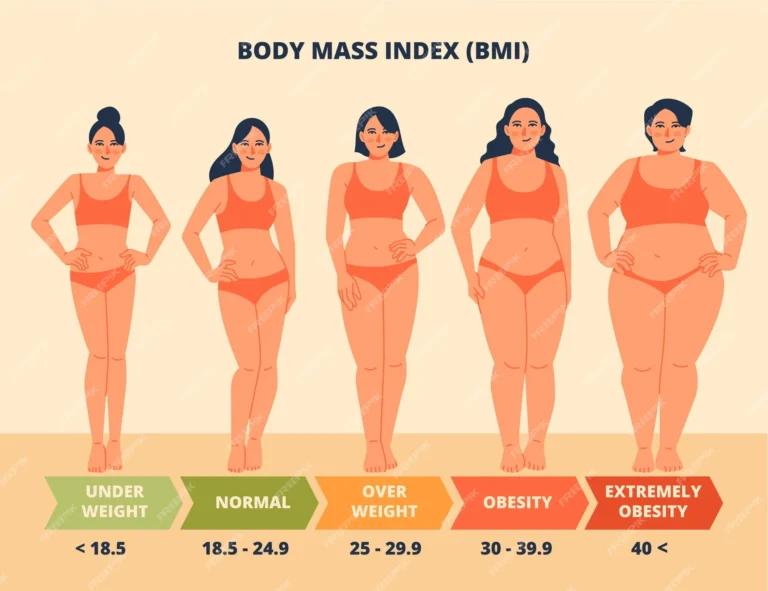The New Year often brings a surge of resolutions focused on health and fitness. Many people set weight-related goals and turn to the Body Mass Index (BMI) as a measure of their progress. However, it’s important to understand that weight and health are not interchangeable. In this article, we will explore the limitations of the use of BMI and the potential dangers of obsessing over weight as an indicator of health.
Health vs. Weight: Understanding the difference
While weight is simply a measure of the Earth’s gravitational pull on an individual, health encompasses a wide range of factors such as blood pressure readings, cholesterol levels, blood glucose levels, cardiovascular health, muscle mass, and mental well-being. It is crucial to recognize that weight alone does not provide a comprehensive picture of a person’s overall health.
BMI, which uses a person’s height and weight to calculate a value, is often used as a screening tool by healthcare providers. However, it is important to note that BMI is not diagnostic of body fatness or overall health. It is merely a starting point for further assessment and should not be the sole determinant of someone’s health status.
The downside of BMI
While higher BMI can be used to identify weight categories that may lead to health problems, it has its limitations. The BMI chart categorizes individuals as underweight, healthy weight, overweight, or obese. However, this classification does not take into account other crucial factors such as body composition, waist circumference, health behaviors, or individual variations.
It is important to recognize that being overweight or underweight does not automatically indicate a health issue. The term “increased risk” is key here. While there may be an increased risk of certain health conditions associated with weight extremes, weight alone is not the sole determinant of one’s measure of health.
A shift in focus: Health-oriented resolutions
Instead of setting weight-focused goals, it is more beneficial to focus on health-oriented resolutions that promote overall well-being. Here are some alternative resolutions that can maximize health and improve overall quality of life:
1. Eat more fruits and vegetables
Incorporating more fruits and vegetables into your diet can provide essential nutrients like potassium, fiber, folate, and vitamin C. You can easily add fruits to your favorite yogurt or explore different forms of fruits and vegetables, such as fresh, frozen, dried, or canned options. The key is to find fast and easy ways to incorporate these nutritious foods into your daily meals.
2. Find an activity you enjoy
Regular exercise is crucial for reducing the risk of cardiovascular disease, type 2 diabetes, certain types of cancer and other chronic diseases. Instead of forcing yourself to follow a specific exercise routine that you dislike, focus on finding an activity that brings you joy. Whether it’s walking, weight training, yoga, or dancing, choose an activity that you genuinely enjoy and stick to in the long run.
3. Practice mindful and intuitive eating
Mindful eating encourages conscious eating without distractions, reducing mindless overeating. Intuitive eating focuses on listening to your body’s natural hunger cues. To eat intuitively, pay attention to your hunger levels before eating and stop eating when you feel satisfied. Avoid using food as a coping mechanism for emotions, boredom, or stress. Slow down your eating pace and savor every bite.
By shifting the focus from weight to overall health, you can set realistic and attainable goals that will benefit your well-being in the long term.
The psychological impact of obesity
Obesity is not just a physical condition; it also has a significant impact on an individual’s psychological well-being. Many people with obesity struggle with issues related to their mood, self-esteem, quality of life, and body image. Understanding these psychological aspects is crucial for providing effective treatment and support.
1. Depression and obesity
Research suggests a strong relationship between excess body weight and depression. Individuals with extreme obesity are significantly more likely to have experienced episodes of major depression. The societal emphasis on thinness as a beauty standard, particularly for women, contributes to the higher prevalence of depression among individuals with obesity.
Approximately one-third of individuals seeking bariatric surgery report clinically significant symptoms of depression, and about half have a lifetime history of depression. Factors such as weight-related stigma, physical discomfort, and disordered eating such as bulimia can contribute to the higher rates of depression in individuals with obesity.
2. Eating disorders and obesity
Disordered eating patterns are common among individuals with obesity. Many individuals report eating for emotional reasons or struggling with portion control and eating behavior. Binge-eating disorder, characterized by consuming large amounts of food in a short period accompanied by a loss of control, is the most common eating disorder among individuals with obesity.
Binge eating can hinder weight loss efforts and increase the risk of weight regain, particularly after bariatric surgery. It is essential to address and treat these eating disorders to ensure long-term success in weight management.
3. Anxiety and obesity
Anxiety disorders, particularly social anxiety disorder, are prevalent among individuals seeking bariatric surgery. The societal emphasis on thinness and the experience of weight-related stigma contribute to increased anxiety in social situations. However, social anxiety alone does not contraindicate weight loss treatment, but uncontrolled anxiety may impact engagement in weight loss treatment.
4. Substance abuse and obesity
While a small minority of individuals with obesity may actively abuse substances, approximately 10% of bariatric surgery candidates report a history of illicit drug use or alcoholism. Surprisingly, individuals with a history of substance abuse may experience larger weight loss following treatment. Overcoming substance abuse may provide individuals with the necessary self-regulation skills to control their eating habits after weight loss treatment.
The impact of weight loss on psychosocial functioning
Weight loss, particularly significant weight loss achieved through bariatric surgery, is often associated with improvements in psychosocial functioning. However, it is essential to acknowledge the potential challenges and health risks associated with weight loss, including the return of pre-existing psychopathology or the development of new psychosocial issues.
Studies have shown that weight loss is associated with improvements in psychosocial characteristics such as symptoms of depression, anxiety, health-related quality of life, self-esteem, body image, and sexual functioning. These improvements are most significant among individuals who have lost a large percentage of their weight, as commonly observed with bariatric surgery.
However, it is crucial to note that some individuals may experience a return of unwanted psychological symptoms or the development of new psychosocial issues after weight loss. Weight regain, regardless of the weight loss approach, also remains a risk factor for the recurrence of psychological symptoms. Therefore, it is essential for treatment providers to assess psychosocial functioning throughout the weight loss journey and remain vigilant for any worsening of symptoms with weight regain.
Evaluating psychosocial functioning in weight loss treatment
Given the psychosocial burden of obesity, it is critical to evaluate an individual’s psychological status and functioning before initiating weight loss treatment. Multidisciplinary treatment teams often include mental health professionals who can assess and treat the psychosocial issues associated with obesity.
Psychosocial evaluations are commonly conducted before bariatric surgery to identify potential contraindications and anticipate postoperative challenges. These evaluations typically involve clinical interviews, psychiatric symptom measures, and assessments of the patient’s knowledge, history, and potential obstacles and resources related to weight loss treatment.
By evaluating psychosocial functioning before treatment, healthcare professionals can tailor interventions and support to address the unique needs and challenges of each individual.
Conclusion: Shifting the focus from weight to health
Relying solely on BMI as an indicator of health can be misleading and potentially harmful. Weight is just one aspect of a person’s overall health, and it should not be the sole determinant of one’s well-being. Rather than obsessing over weight gain, it is crucial to focus on health-oriented goals that prioritize overall well-being, including balanced nutrition, regular physical activity, and emotional well-being.
Understanding the psychological impact of obesity is essential for providing effective treatment and support. Mental health professionals play a crucial role in assessing and addressing the psychosocial issues associated with obesity, helping individuals achieve long-term success in weight management.
As we embark on our health journeys, let us shift our focus from weight to health, embrace body positivity, and prioritize overall well-being. Remember, health comes in all shapes and sizes, and by adopting a holistic approach to wellness, we can achieve optimal health and happiness.
Sources
- Scaling Back on the Unhealthy Obsession with Weight – Food Insight
- Addressing weight stigma and fatphobia in public health | School of Public Health – University of Illinois Chicago
- The Psychosocial Burden of Obesity – PMC
Medical Disclaimer
NowPatient has taken all reasonable steps to ensure that all material is factually accurate, complete, and current. However, the knowledge and experience of a qualified healthcare professional should always be sought after instead of using the information on this page. Before taking any drug, you should always speak to your doctor or another qualified healthcare provider.
The information provided here about medications is subject to change and is not meant to include all uses, precautions, warnings, directions, drug interactions, allergic reactions, or negative effects. The absence of warnings or other information for a particular medication does not imply that the medication or medication combination is appropriate for all patients or for all possible purposes.








